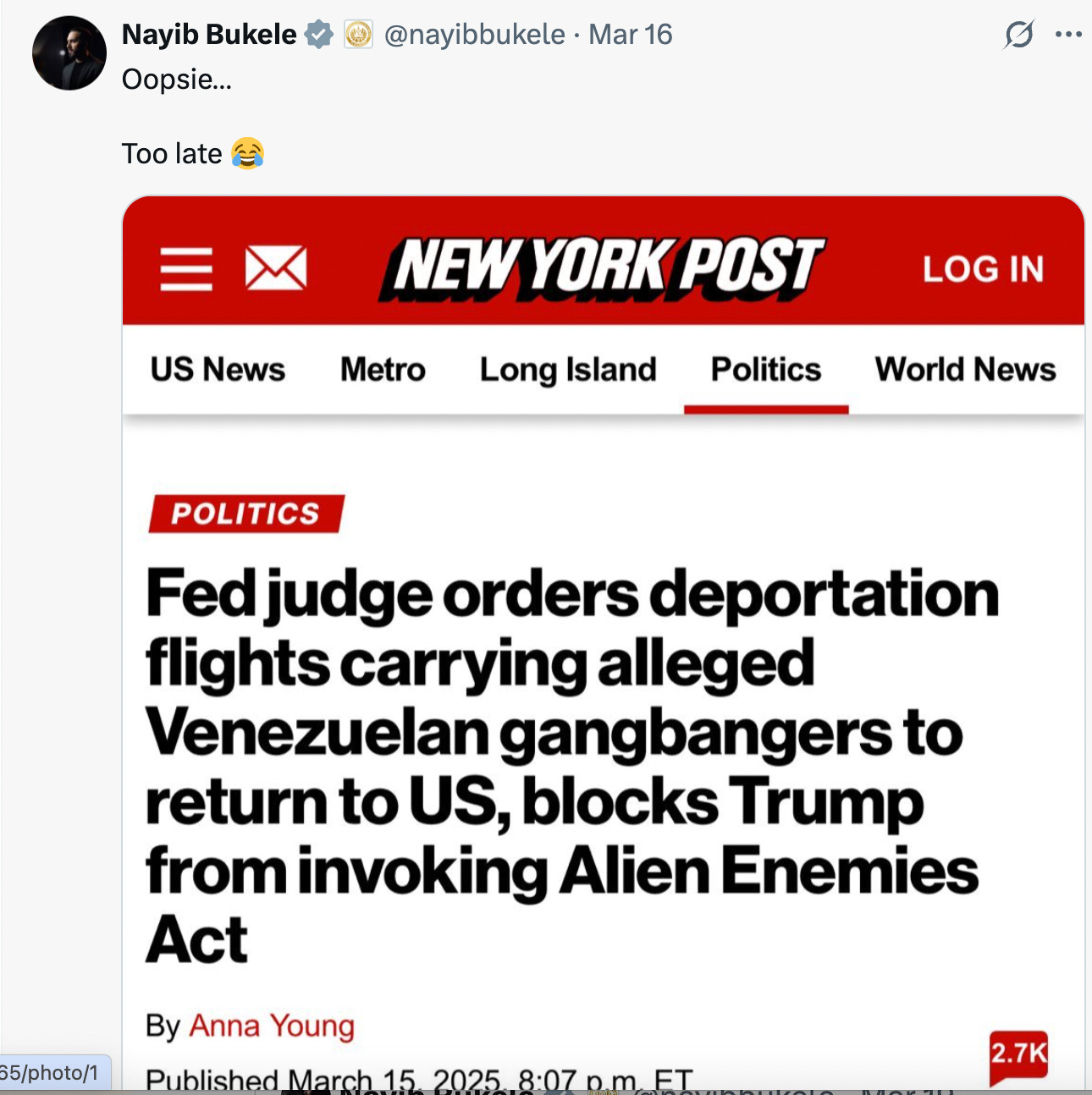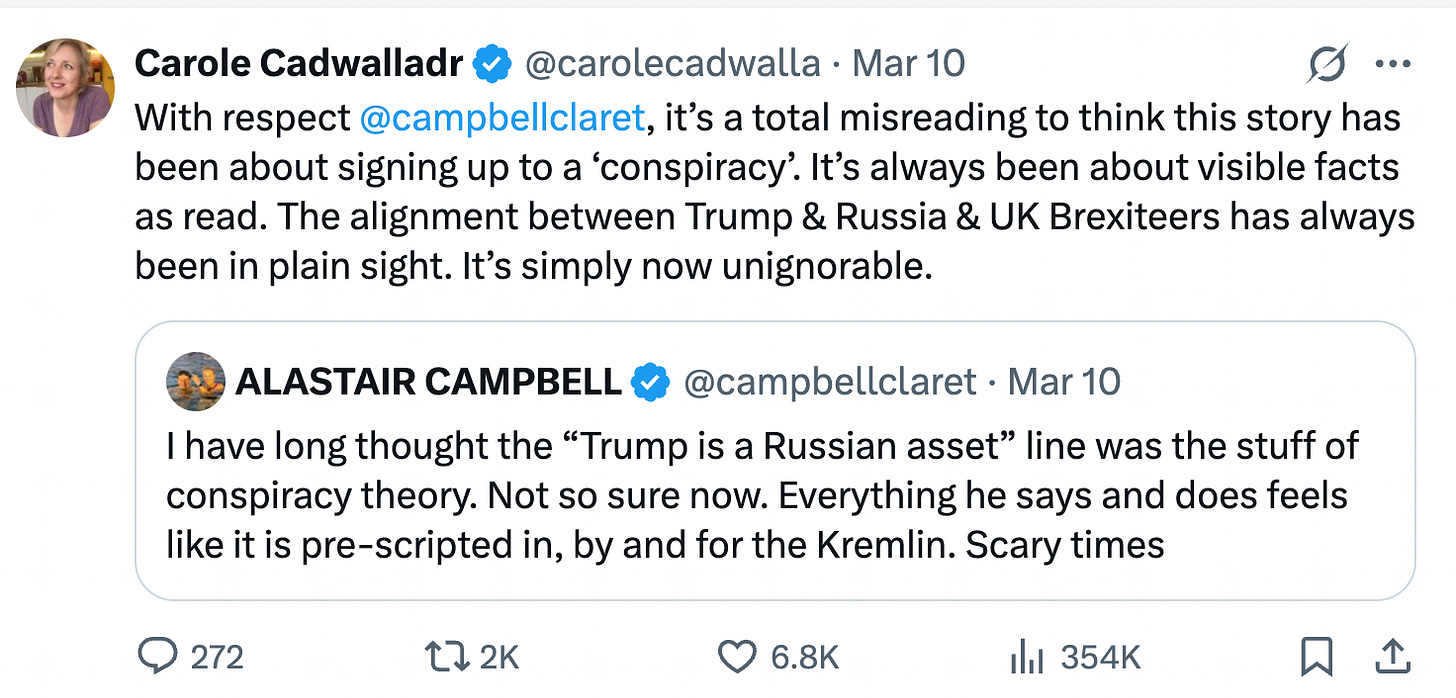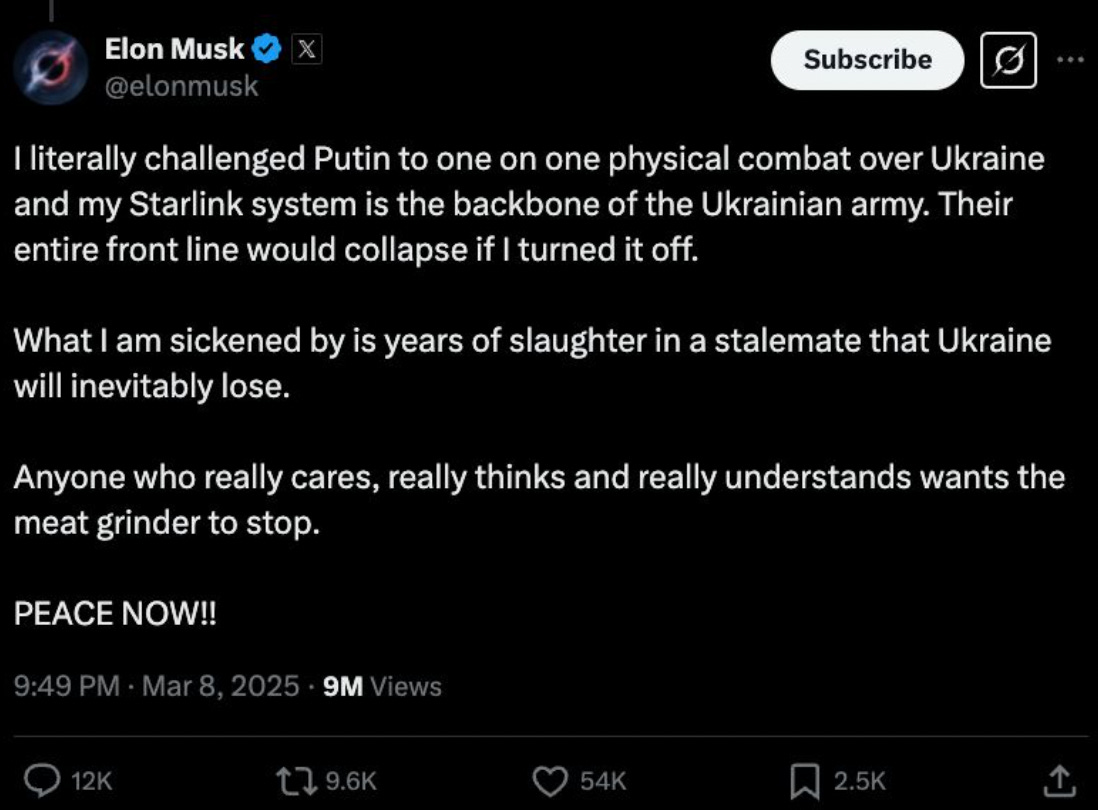This post has been sitting in my draft for three weeks now. I’m sorry for the radio silence and thank you for your patience. I’ll include some of what I wrote previously below but a bit of an explanation, first. I think I’ve been suffering a bit of news whiplash. The news in general, and my own corner of it.
Trump’s re-election in November fell just as we, the journalists of the Guardian and Observer, were fighting to save what we felt was the soul of our news organisation, though sadly that wasn’t a recognised line item on any P&L report.
The fight was energising and instructive and clarifying on many levels, but the backwash from it has also been time-consuming and draining. I’ll fill you in on that another time. But I think I’ve finally felt, on the personal level, the “information collapse” that I’ve been thinking and talking a lot about recently.
It’s the term that I’ve been using to describe the tectonic shifts in our news and information system and the chaos of a world in which algorithmically driven social media on platforms owned by unaccountable monopolists has driven out fact-based reporting and news.
We’re dealing with a world in which truth and lies and conspiracy and science compete for eyeballs but not on a level playfield. The game is algorithmically rigged. Conspiracies are often more fun than facts. They drive more engagement and engagement makes more money, that actually is a fact. Meanwhile, journalism is expensive. Since Musk bought Twitter, it’s become impossible to ignore: endless content from MAGA accounts you don’t follow interlaced with crackbait viral videos.
But it’s one thing to write about information collapse, and another to live it. The Observer, or the hollowed-out shell of it, transfers to Tortoise on April 23rd and 100+ journalists have been terminated from the Guardian in various different guises. I’ve said before that in some ways, it doesn’t feel like a particularly surprising coincidence that this happened at the same moment that the tech bros merge with the US presidency. But on the other hand, it has been a lot to deal with.
And then, there’s the news. The only positive is that now that people are being kidnapped off the street by plain clothes ICE agents, the mainstream media has at least become bolder in naming what’s happening. You’ve probably seen stories about the Venezuelan deportees who’ve been shipped off to the megaprison in El Salvador including a Dallas bakery worker whose family claim he was identified as a gang member on the basis of an autism awareness tattoo.
Something about the story had snagged in my brain since I went down a rabbit hole of reading and watching videos on the prison and today, I realised why it’s bothered me so much. It’s not just that it is visibly a concentration camp, though it is. It resembles a set of vast battery chicken sheds for humans. The US deportees taken without any due process and with distressingly little chance of ever getting out are being placed in cells of more than 80 men crammed into tiered metal bunks. The whole place is a human rights violation but the authorities happily let in the cameras and show off the highly militarised guards and brutally choreographed admittance procedures.
What I’ve realised is that this is a concentration camp designed for social media. A point that was proved when the US Secretary for Homeland Security filmed herself in front of rows of silent prisoners and posted it on Twitter. I don’t quite know what this trend should be called. #fascistporn?
That’s a gold rolex, she’s wearing obviously.
The prison has been a key plank in the president of El Salvador’s strongman credentials and the alliance with Trump feels like a macabre new model for international relations.
A federal judge ordered the plane to turn around and return the deportees, and this was President Bukele’s response:
Bukele describes himself as a “philosopher king” in his Twitter profile and he’s a shitposter in the mould of Musk, retweeted by Musk, and now offering cutprice offshore rates for US’s first fascist outsourcing needs.
The prison episode, I’ve realised, isn’t just another bullet point in the breaking of the American Republic. And the US hasn’t just joined the axis of autocracy. This is a new an axis of edgelord strongmen who understand memetic warfare. And this feels like just the beginning.
Wood for trees
I hadn’t seen Bukele’s tweet until I read about it in this piece in the Guardian by Larry Tribe. He’s a Harvard professor and one of the leading constitutional scholars in America who has long been a clear and prescient voice about the risks that Trump poses to American democracy. He’s also someone who understands the role of technology in what we’re seeing happening. I got to know him a bit in the run-up to the 2020 US presidential election when he joined the Facebook Oversight Board.
The piece is a superb response to the dry and scholarly debate in the US about exactly what constitutes a “constitutional crisis” as opposed to some punchy executive orders that may be overturned etcetc. It explains some of the timidity of the press coverage to date and Larry helpfully scythes his way through the consitutional dithering:
But searching for evidence of a “constitutional crisis” in the rapidly escalating clashes of the executive branch with the judicial branch misses the larger cataclysm taking place across the US. This president, abetted by the supine acquiescence of the Republican Congress and licensed by a US supreme court partly of his own making, is not just temporarily deconstructing the institutions that comprise our democracy. He and his circle are making a bid to reshape the US altogether by systematically erasing and distorting the historical underpinnings of our 235-year-old experiment in self-government under law.
What we are currently living through is nothing less than a reorganized forgetting of the building blocks of our republic and the history of our struggles, distorting what it means to be American. The body politic is being hollowed out by a rapidly metastasizing virus attacking the underpinnings of our entire constitutional system. Make no mistake. This is how dictatorship grows.
How to WhatsApp an (alleged) Russian spy
Now that Trump and Putin are buddies, Britain has become Russia’s number one enemy. That’s not supposition. Reuters has reported that the Russian foreign intelligence service had made a rare public announcement:
“London today, like on the eve of both World Wars of the last century, is acting as the main global ‘warmonger. The time has come to expose them and send a clear message to ‘perfidious Albion’ and its elites: you will not succeed.”
What’s so striking about this is the language. It is a direct echo of the November 2017 speech that Theresa May made at the Lord Mayor’s banquet in which she called out Russia’s war of aggression against Ukraine and its weaponisation of the information space:
It’s an incident – and how it fits into a wider pattern of call and response – that we discuss in episode 6 of Sergei & the Westminster Spy Ring, the investigative podcast I’ve done with fellow journalist, Peter Jukes, super-producer Ruth Abrahams and Sergei Cristo, a dogged Russian-born British citizen who’s been trying for a decade to reveal the Kremlin’s attempts to subvert British insitutions.
It’s been pretty uncanny timing to have been writing and recording the final episodes of the podcast as the entire Russia-US relationship has shifted on its axis. And after we recorded the final episode, we had one last thing to do: call the alleged Russian spy who kicked the entire story off.
It’s another Sergei: Sergei Nalobin, the former first political secretary at the Russian Embassy in London.
We’d been sitting on two telephone numbers for him that had been published on a Ukrainian NGO website. There was obviously no way that the telephone number would still be functioning, it had presumably been exposed in a hack or leak of data from inside Russia, but we’d been making allegations about Nalobin throughout the series and it’s journalistic protocol to put those to the person in question and give them a right of reply.
So we tried the numbers. Peter rang from his phone and, as we expected, neither worked. But then I had the idea of putting them into WhatsApp and seeing if any details came up. A woman’s photo appeared and without thinking I called the number. This is what happened next:
Those “fucks” are real. I really never expected the number to be working. And the shock when the woman passes the phone to the man is very real. “Is it Sergei?” I ask. “Слушаю vас,” he answers. “I’m listening to you.” You can hear the freeze in my voice as my ask my question and then Nalobin’s reply, “I cannot help you.”
Not in this clip is my mini freakout that followed immediately afterwards, though we’ve put in in the episode. Calling an alleged Russian spy on WhatsApp on my own phone felt both dumb and instructive. Dumb because, well…the risk calculus on all things Russia has changed. Although by far the burden of that risk falls on Sergei, as the former Russian national (he’s now a British citizen).
The episode also includes an interview with Rainer Saks, the former head of Estonian intelligence. In 2022, we learned that Nalobin had taken up a posting there and was again expelled after Russia’s invasion of Ukraine. Saks describes Nalobin as an exceptionally talented operative with “aggressive tradecraft”.
And that there was no doubt, he said, that I had been the target by Kremlin information operations. He described the “scientific” approach that they use to target journalists and especially female journalists who they psychologically profile and then attack.
If a target is really valuable, they put a huge team to work with this profile. If you have to protect yourself personally as well, if you don’t have a team behind who helps you, at least a huge team, you are wasting your time just for this personal protection. You have much less time to deal with your job. It was doing before, and this is, unfortunately, it’s quite a classical case you have experienced, I would say.
Estonia is a frontline state and hearing this from someone who deeply understands the the Kremlin’s information operations was weirdly emotional.
Tony Blair’s former spin doctor, Alastair Campbell, and now one of Britain’s most influential political pundits tweeted this a couple of weeks ago encapsulating where mainstream opinion has been on the issue for the last eight years. This is not to throw shade on Alastair who has been very supportive of my journalism. But I was moved to respond to his tweet because the idea of a “conspiracy” was what so much abuse directed at this story (and to anyone who’s reported on it) focussed on.
And, if Rainer Saks is right, was itself amplifed by the Kremlin. (I’m happy to report that Alastair took it in good spirit and discussed it on an episode of the Rest is Politics.)
But the Nalobin incident was also instructive because in the making of the podcast, we leaned into the John le Carré spy genre to try and bring this story to a mainstream audience. We wanted to make it sound like drama and to a large part we succeeded, through Ruth’s skilful production and sound design. But calling Nalobin and having him answer, a real person, not a dramatis personnae, felt like we’d somehow broken the fourth wall.
And in any case, it isn’t a spy drama, it’s actually horror. We’re numb to it and Trump and Musk are trying to make us number to it. Worse, to make us bored of the ongoing murder and slaughter of civilians and believe that Ukraine’s defeat is a certainty. The chill I felt on the phone to Nalobin is the chill of reality.
The whole series is out now if you’re a box set binger and if you want to hear more, sign up to the Citizens newsletter as we’ll be advertising events around the series and issues it’s brought up. Also, Sergei has a crowdfunder if you’re able to bung in a few quid as he’s paid quite a high price for his whistleblowing activities.
The episode also includes a conversation between, Sergei, me and Luke Harding, the Guardian journalist who broke the initial story with him and who is relentlessly cheerful by nature. And this was his reflection with Sergei that I thought I’d extract and end on here.
I think deep down, we both care about democracy, we both recognize that it’s under threat and that this decade quite similar to the 1930s I don’t know if you agree, Sergei, but we could debate whether it’s 37, 38, 39 but it feels to me that it’s really difficult times, and that in these difficult times, people of good faith and good cheer and good spirit should support each other, and I think that’s what we do.
This post has been syndicated from How to Survive the Broligarchy, where it was published under this address.






